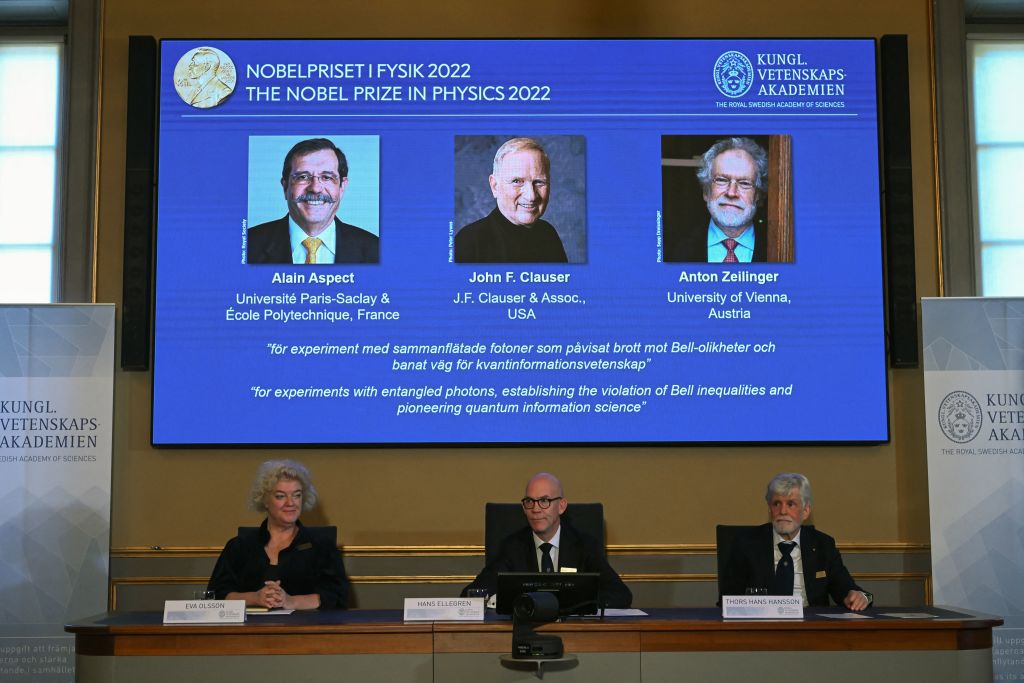3 scientists share Nobel Prize in Physics for quantum mechanics work


A free daily email with the biggest news stories of the day – and the best features from TheWeek.com
You are now subscribed
Your newsletter sign-up was successful
The Nobel Prize in Physics has been awarded to Alain Aspect, John F. Clauser, and Anton Zeilinger for their work on quantum mechanics and technology.
The trio conducted experiments on particle entanglement, which is when two particles behave similarly and impact one another even when far apart, CNN explains. Their experiments showed that quantum entanglement, a phenomenon Albert Einstein famously called "spooky," was real and not just theoretical.
Aspect, Clauser, and Zeilinger independently conducted their experiments from France, California, and Austria, respectively, where they studied the behavior of small particles like electrons with respect to quantum entanglement. Entanglement could allow the transfer of information across huge distances between quantum computers, a huge step for quantum information science. As Zeilinger explained, "[Y]ou can transfer all the information carried by an object over to some other place … where the object is reconstituted." This has only been done with small particles so far, he added.
The Week
Escape your echo chamber. Get the facts behind the news, plus analysis from multiple perspectives.

Sign up for The Week's Free Newsletters
From our morning news briefing to a weekly Good News Newsletter, get the best of The Week delivered directly to your inbox.
From our morning news briefing to a weekly Good News Newsletter, get the best of The Week delivered directly to your inbox.
The physicists' work builds off that of 1960s physicist John Stewart Bell, who studied whether particles that had flown too far apart to communicate could still work in concert, The New York Times reports. Quantum mechanics allows for particles to exist simultaneously in two or more places, and a change measured in one particle also shows a change measured in the others.
The Nobel Committee for Physics said the winning trio's findings "laid the foundation for a new era of quantum technology." Their work has otherwise been highly regarded for decades, CNN reports.
A free daily email with the biggest news stories of the day – and the best features from TheWeek.com
Devika Rao has worked as a staff writer at The Week since 2022, covering science, the environment, climate and business. She previously worked as a policy associate for a nonprofit organization advocating for environmental action from a business perspective.
-
 How the FCC’s ‘equal time’ rule works
How the FCC’s ‘equal time’ rule worksIn the Spotlight The law is at the heart of the Colbert-CBS conflict
-
 What is the endgame in the DHS shutdown?
What is the endgame in the DHS shutdown?Today’s Big Question Democrats want to rein in ICE’s immigration crackdown
-
 ‘Poor time management isn’t just an inconvenience’
‘Poor time management isn’t just an inconvenience’Instant Opinion Opinion, comment and editorials of the day
-
 5 recent breakthroughs in biology
5 recent breakthroughs in biologyIn depth From ancient bacteria, to modern cures, to future research
-
 Blue Origin launches Mars probes in NASA debut
Blue Origin launches Mars probes in NASA debutSpeed Read The New Glenn rocket is carrying small twin spacecraft toward Mars as part of NASA’s Escapade mission
-
 Dinosaurs were thriving before asteroid, study finds
Dinosaurs were thriving before asteroid, study findsSpeed Read The dinosaurs would not have gone extinct if not for the asteroid
-
 SpaceX breaks Starship losing streak in 10th test
SpaceX breaks Starship losing streak in 10th testspeed read The Starship rocket's test flight was largely successful, deploying eight dummy satellites during its hour in space
-
 Rabbits with 'horns' sighted across Colorado
Rabbits with 'horns' sighted across Coloradospeed read These creatures are infected with the 'mostly harmless' Shope papilloma virus
-
 Lithium shows promise in Alzheimer's study
Lithium shows promise in Alzheimer's studySpeed Read Potential new treatments could use small amounts of the common metal
-
 Scientists discover cause of massive sea star die-off
Scientists discover cause of massive sea star die-offSpeed Read A bacteria related to cholera has been found responsible for the deaths of more than 5 billion sea stars
-
 'Thriving' ecosystem found 30,000 feet undersea
'Thriving' ecosystem found 30,000 feet underseaSpeed Read Researchers discovered communities of creatures living in frigid, pitch-black waters under high pressure
